
M&A 2023 Recap and 2024 Outlook
2023 M&A Market Review
M&A activity in North America slowed in 2023, marking a departure from the unprecedented highs seen in 2021 and 2022. Deal closings in 2023 were more in line with pre-COVID levels, declining 19% to 15,440 from 19,089 in 2022, and notably lower than the height of 21,180 deals in 2021. U.S. PE middle-market buyout activity fell off by 27% in 2023.
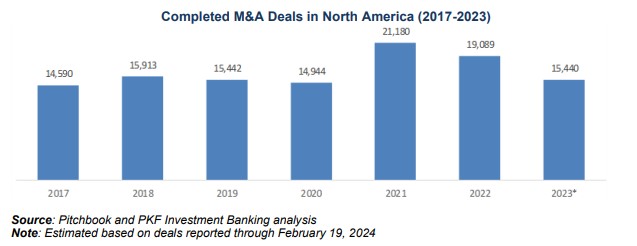
Higher interest rates, fears of a recession, persistent inflation, credit market tightening, geopolitical uncertainties and a dislocation in buyer/seller value expectations across many sectors have all contributed to the 2023 decline.
Higher interest rates were a primary driver of the 2023 slowdown, leading to higher borrowing costs and lower valuations. A tighter credit market and increased scrutiny from lenders reduced debt leverage to fund transactions, especially platform investments by private equity.
The collapse of several high-profile regional banks in early 2023, in addition to the above factors, furthered economic uncertainty with fears of a recession.
Since mid-2022, the combination of leverage buyout market tightening and economic uncertainty created a dislocation in buyer/seller value expectations. This misalignment resulted in a material decrease in private equity exits, further impacting the M&A landscape in 2023.
According to Pitchbook, 75.9% of PE buyout activity in 2023 were add-ons, which is a cost efficient way for PE firms to continue to deploy capital despite higher interest rates and economic uncertainty. Financing add-ons is typically more feasible due to their smaller size and the borrowing from existing credit facilities.
Earnouts and seller notes were effective tools in facilitating deal agreements as a result of tighter credit markets, valuation disconnect and economic uncertainty.
Optimism About the 2024 M&A Environment
Dealmakers are optimistic about an improvement in the M&A environment. A survey by the ACG community revealed that 55% of respondents foresee an increase in deal activity in 2024, while 27% expect activity to remain in line with 2023. Only 18% anticipate a decline.
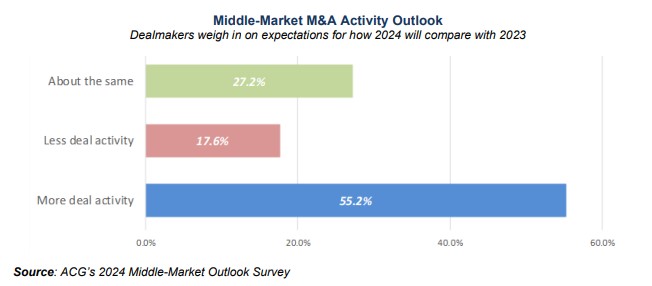
The EY-Parthenon Deal Barometer forecasts a 13% rebound in U.S. PE deal volume in 2024, while anticipating a gradual increase in corporate M&A activity throughout the year with an average rise of 12% in 2024.
Drivers of M&A Activity in 2024
Driven by optimistic expectations for the U.S. economy and a decrease in market challenges, a rebound in M&A activity is anticipated in 2024 by the dealmaking community. Inflation, though still higher than the Fed’s target, has decreased and interest rates have stabilized with an expected gradual decline this year. Signs of improvement are evident in traditional credit markets, and private credit has become more widely available. Equity markets have also rebounded and reached new highs.
Expected Interest Rate Reductions Should Increase M&A Activity
Although rates are projected to remain constant for the first half of 2024, an ending to rate hikes supports a more favorable financing environment. Expected rate reductions are likely to fuel M&A activity in the second half of 2024.
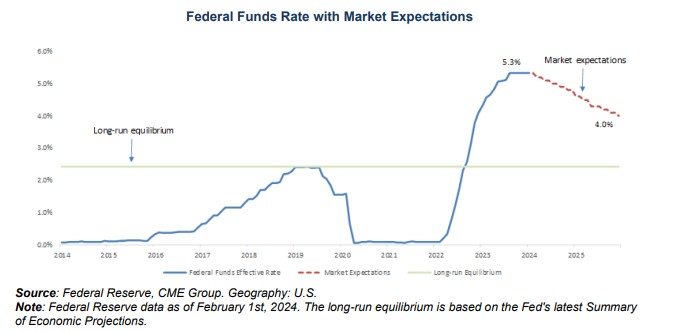
Buyers’ Abundant Purchasing Power
Significant amounts of capital are available for acquisitions from sovereign wealth funds, family offices, PE and VC investors and corporations with strong balance sheets. According to S&P Global, global private equity dry powder has reached a record $2.59 trillion, up 8% since 2022. A growing level of dry powder has created pressure to utilize more capital as interest rates remain steady and are expected to decline.
Narrowing Price Gap
The disparity between seller and buyer expectations has contracted and is anticipated to further narrow during 2024. Nevertheless, the highest quality assets still command a premium valuation, reflecting the continued demand for “A” quality investments in the market.
Increase in PE Exit Activity
Firms are currently retaining portfolio companies longer than usual since the decline in PE exits in the early part of 2022; in the absence of attractive exit returns, PE firms shifted toward a more hands-on operational strategy, spending more time engaging with operating professionals to enhance the performance of their portfolio companies. With pressure on PE firms from limited partners to return capital and a more favorable exit market, an increase in PE exits in 2024 is expected.
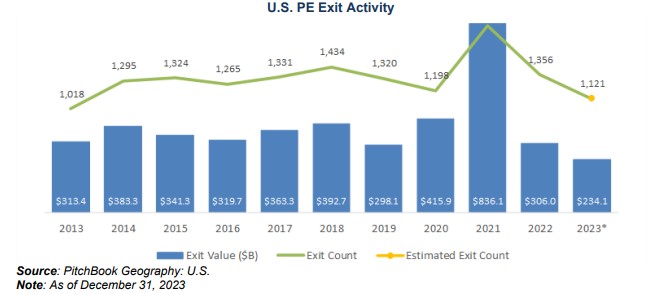
More Leverage Available in the Market
Alternative lenders now have more opportunities given the tighter traditional bank lending market over the past 20 months. There are many financing options available to accommodate the needs of acquirers. For example, the private credit market grew to approximately $1.4 trillion at the start of 2023, up from $875 billion in 2020. The market is projected to grow to $2.3 trillion by 2027, according to Morgan Stanley. We anticipate that private credit will continue to play a significant role for new deals in 2024.
Technology Is Anticipated to Increase M&A in Certain Sectors
The fast pace of technological advancements will compel certain companies to actively pursue acquisitions for the purpose of integrating new technologies into their operations to gain a competitive edge. This is expected to increase deal activity across various sectors, including artificial intelligence, health care and fintech.
Outlook 2024 – Increase in Activity Expected
Despite a generally positive outlook in deal activity for 2024, potential challenges could create headwinds for transaction activity as the year goes on. Ongoing conflicts in Ukraine and the Middle East, coupled with the unpredictability of the Fed’s future actions on interest rates and the 2024 presidential election, are key considerations for dealmakers.
We anticipate favorable M&A drivers will outweigh market challenges and lead to a modest increase in deal volume of 3% – 5% in 2024. We expect deal activity in the first half of 2024 to be in line with the last few quarters of 2023 and then increase during the second half of 2024.
Contact Us
Robert Murphy, Senior Managing Director, PKF Investment Banking
rmurphy@pkfib.com | 561.337.5324
Susan Zhang, Vice President, PKF Investment Banking
szhang@pkfib.com | 201.639.5739
About PKF Investment Banking
PKF O’Connor Davies Capital LLC (DBA PKF Investment Banking) is the investment banking affiliate of PKF O’Connor Davies. PKF O’Connor Davies Advisory LLC is a member firm of the PKF International Limited network of legally independent firms and does not accept any responsibility or liability for the actions or inactions on the part of any other individual member firm or firms.
The PKF Investment Banking team has completed over 250 M&A advisory and capital raise engagements in North America and abroad. Companies and business owners across a range of industries rely on our transaction and sector expertise, global reach, confidentiality and utmost integrity to help them achieve their objectives. We focus on privately held companies and have extensive knowledge with decades of experience advising middle-market businesses. Our key services include sell-side and buy-side M&A advisory, exit readiness and transaction planning.
Disclaimer
PKF Investment Banking provides this report for information purposes only and it does not constitute the provision of financial, legal or tax advice or accounting or professional consulting services of any kind. Securities-related transactions are processed through an unaffiliated broker-dealer, Burch & Company, Inc.

M&A Deal Activity Stabilizing in Second Half 2023
The decrease in North American M&A deal count has shown signs of slowing down, as illustrated in the chart below. After six consecutive quarters of consistent decline following the peak in Q4 2021, the rate of decrease in deal count appears to be moderating. PKF Investment Banking estimates M&A deal activity stabilizing in the second half of 2023. We expect Q4 to be similar to Q2 and Q3 levels of 3,600 – 3,700. It is important to highlight that the North American M&A deal count in 2023 is projected to approach the preCOVID levels seen in 2018 and 2019, both of which were considered strong M&A markets.
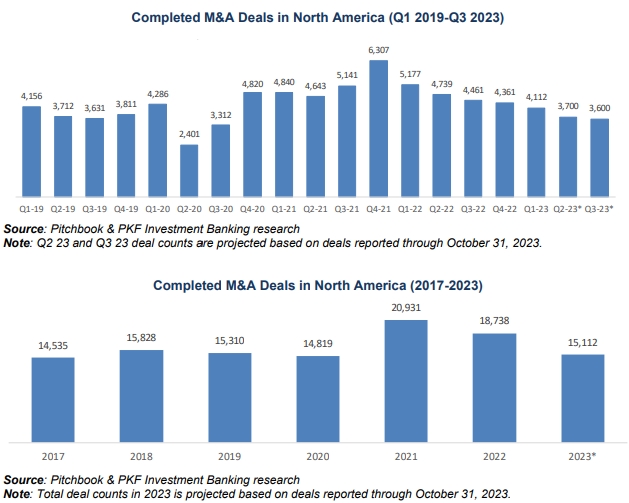
The decline in activity in 2022 and 2023 can be attributed to several factors: higher interest rates, recessionary fears, persistent inflation, tightened credit markets, geopolitical uncertainties and a dislocation in buyer/seller value expectations across various sectors.
The lower middle market (LMM) with deal sizes ranging from $10 million to $250 million is less impacted by interest rates and tightening debt markets. This is due to more moderate leverage levels associated with these deal sizes, and many of the LMM deals involve add-on acquisitions. While LMM activity has benefited from an increased focus on add-ons by PE, it has not been immune to the headwinds mentioned above.
A Pause in Interest Rate Hikes Reduced Upward Pressure on Borrowing Costs
The Federal Reserve’s decision to maintain the rates steady at 5.25-5.50% during its September 19-20, 2023, FOMC meeting marked a temporary break from the previously aggressive rate-hiking campaign initiated in March 2022 to combat inflation. This pause, expected by the market, provided relief by easing the upward pressure on borrowing costs, a key challenge for dealmaking. It’s worth noting, however, that the Federal Reserve has indicated the possibility of another rate increase beyond the current 5.25% to 5.50% range. This reflects the central bank’s ongoing effort to balance inflation control with support for economic growth and stability.
PE Platform Activity Continued to Decline while Add-on Activity Remained Steady
According to Pitchbook, platform deals declined by 20.6% in value from the prior quarter and 42.9% YTD. Higher debt financing costs and contracting leverage ratios remain challenges to platform deals.
On the other hand, add-on deals, with much smaller deal sizes and lower reliance on new debt, have consistently represented over 70% of all buyouts. Pitchbook reports that add-ons have reached a near record high share of all PE buyouts at 76.1% YTD.
With $1.4 trillion in unspent dry powder, PE firms are utilizing add-on opportunities to deploy their capital while awaiting a more favorable environment for platform acquisitions.
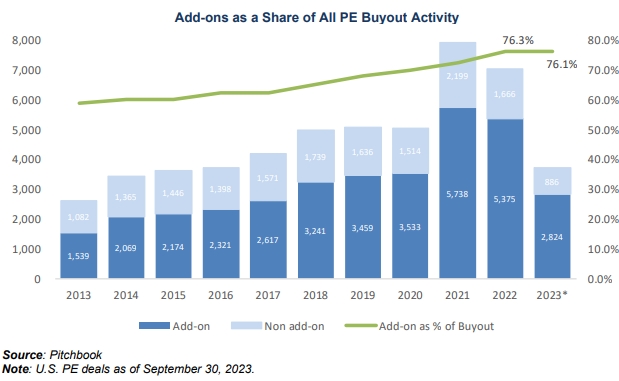
M&A Transaction Backlogs and PE Exits Are Waiting for Market Resurgence
The deceleration of M&A activities since 2022 has led to a backlog of M&A transactions waiting to go to market. Concurrently, the PE exit markets have continuously shown signs of a downturn. According to data from Pitchbook, Q3 saw a total of 275 PE-backed companies exiting the market, accumulating an exit value of $44.1 billion. This marks a decline of 6.9% and 40.7% on a quarterly basis, respectively.
Factors such as economic uncertainty, a challenging lending environment and valuation volatility have dampened the enthusiasm of PE firms for pursuing new deals. Instead, they are increasingly inclined to extend their ownership of portfolio companies. Chiefexecutive.net reports that the median holding periods of PE-backed portfolio companies have reached historical lengths, now standing at 5.6 years, the longest duration observed in over two decades.
As the economic landscape stabilizes and financing dynamics improve, accumulated M&A backlogs, particularly those comprising PE-backed portfolio companies, are poised to offer a pool of attractive assets for prospective investors.
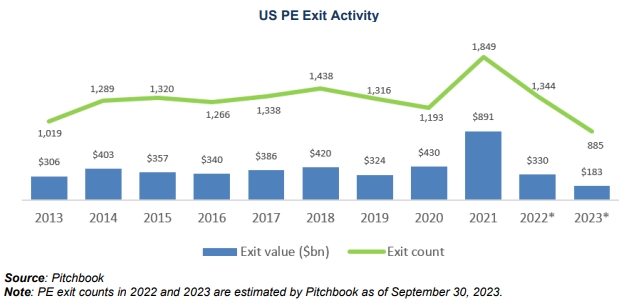
Valuation Compression in 2023
Recessionary fears, disappointing company performance, higher borrowing costs and a tighter lending environment have collectively pushed down valuation multiples across the board. However, the shift in valuation multiples varies significantly across industry sectors and individual company performances. A flight to quality by investors continues. Companies demonstrating robust operating performance in sectors better equipped to withstand a recession continue to experience strong valuation multiples.
The chart below illustrates TEV/EBITDA multiples categorized by TEV tier on a rolling four-quarter basis.

The lower end of the LMM has shown more resilience in terms of valuation multiples. PE firms remain highly active in pursuing add-on acquisitions to grow their platforms. Additionally, lower debt leverage is utilized in these deal sizes, and there is less of a valuation disconnect between buyers and sellers, as deals in the LMM tend to transact within a tighter multiple range. It is worth highlighting the noticeable increase in the utilization of earnouts and seller notes to help bridge the valuation gap.
Outlook – Near Term Stable Activity Level with Moderate Increase Later in 2024
In the coming quarters, we anticipate stable activity levels in the M&A market for Q4 2023 and Q1 2024, with the expectation of a gradual increase in activity during 2024. Several compelling near-term drivers could stimulate M&A activity:
- Moderating Interest Rates. Private equity activity is expected to increase as interest rates in North America stabilize and eventually decline. Lower interest rates will make financing more attractive and accessible leading to a resurgence in deal-making, especially LBOs within the PE sector.
- Record-Level Dry Powder. With substantial funds on hand, PE firms are under pressure to seek out viable investment opportunities rather than letting their raised capital remain idle for extended periods.
- Valuation Convergence. The narrowing gap in valuation between potential buyers and sellers is likely to facilitate more fruitful negotiations and bring both parties back to the table, spurring increased M&A transactions.
- Sizable Deal Backlog. A backlog of M&A deals, combined with an abundance of exit opportunities for PE-backed firms, is expected to create a wealth of investment prospects. We believe sponsors will adopt a more assertive stance in deploying capital to close out existing funds and to capitalize on portfolio company realizations, which will support future fundraising efforts.
While we acknowledge the existing challenges, these key drivers offer reasons for optimism within the M&A landscape as we navigate through the uncertainties of the coming quarters. For pdf version click here.
Contact Us
Robert Murphy
Senior Managing Director
PKF Investment Banking
rmurphy@pkfib.com | 561.337.5324
Susan Zhang
Vice President
PKF Investment Banking
szhang@pkfib.com | 201.639.5739
About PKF Investment Banking
PKF O’Connor Davies Capital LLC (DBA PKF Investment Banking) is the investment banking affiliate of PKF O’Connor Davies. PKF O’Connor Davies Advisory LLC is a member firm of the PKF International Limited network of legally independent firms and does not accept any responsibility or liability for the actions or inactions on the part of any other individual member firm or firms.
The PKF Investment Banking team has completed over 250 M&A advisory and capital raise engagements in North America and abroad. Companies and business owners across a range of industries rely on our transaction and sector expertise, global reach, confidentiality and utmost integrity to help them achieve their objectives. We focus on privately held companies and have extensive knowledge with decades of experience advising middle-market businesses. Our key services include sell-side and buy-side M&A advisory, exit readiness and transaction planning.
Disclaimer
PKF Investment Banking provides this report for information purposes only and it does not constitute the provision of financial, legal or tax advice or accounting or professional consulting services of any kind. Securities-related transactions are processed through an unaffiliated broker-dealer, Burch & Company, Inc.

7 Reasons to Use an Investment Banking Team to Sell Your Company
Are You the Best Person to Sell Your Business?
Enhancing deal value and increasing certainty to close are what investment bankers do every day. As competition and technological advances continue to drive consolidation across many industries, it’s likely you’ve been contacted by a variety of buyers, or their agents, interested in acquiring your company.
According to S&P Global Market Intelligence, global private equity dry powder soared to a record $2.4 trillion in mid-2023. Private equity firms are in business to secure returns for their investors, so all that cash needs to find a home. In addition, strategic buyers are actively searching for acquisitions as a component of their growth plan.
As an entrepreneur, you’ve succeeded by seizing opportunities, and it could be tempting to pursue a specific buyer who appeals to you. However, even if you’ve sold a company before, it’s rare that a business owner can maximize value and achieve superior deal terms on their own.
The Right Investment Banking Team Empowers You
The team you should rely on is one that has gained wisdom by completing hundreds of deals ‒ and seeing some failed deals too. For the most important sale you’ll ever close, it’s critical to engage the right investment banker who can empower you all through the deal process, from start to finish.
An experienced investment banking team can enhance the value of your business and increase certainty to close by providing:
- Multiple deal options – The only way to know if you’ve received the best possible offers for your business is through a competitive auction among buyers ‒ including those you’re aware of and those you never knew existed. An astute investment banking team has the capabilities, resources, and processes to present you with a range of options.
- Negotiating prowess – While you may be able to skillfully negotiate various transactions related to running your company, the team working on your deal is better positioned to garner the highest value and best terms for your business.
- A buffer between you and buyers – Staying focused on keeping your business growing and profitable is crucial during the marketing and sale process. Plus, selling a business can stir up a lot of emotion. Best to let professionals take the lead in negotiating value, deal terms and critical deal issues with buyers and other professionals throughout the transaction.
- Early warning system – A mature investment banking team can recognize when the other party is not sincere or when the certainty of closing a deal is low. You don’t want to waste time on a buyer who is displaying low odds of completing a successful deal.
- Guidance based on market trends and dynamics – Understanding the current market value and terms is key to setting realistic goals. An effective team can identify and convey the real and often hidden value of your business to buyers. This increases your chances of receiving a premium offer compared to market benchmarks.
- Creativity and resourcefulness in resolving deal issues – Anticipating business issues that are likely to arise in due diligence and preparing management to address them will reduce the risk of a broken deal. Since few businesses have no shortcomings, challenging issues that arise either before or during due diligence often require investment banking creativity to resolve.
- Maximum deal control to your advantage – The deal journey can be formidable. Investment bankers are skilled at controlling the sale process and driving to the closing date.
Team Up with Experts
High-performing investment bankers don’t have just one or two techniques they rely on to achieve success. They set standards of excellence for themselves and are systematic about realizing those standards on every deal. By partnering with the right team, you’ll be bringing integrity, expertise, options, deal control and unshakeable confidence to the sale of your most valuable asset.
Contact Us
If you’re thinking of selling your business in the near future, contact us for a preliminary conversation as to your company’s readiness for a marketing process or for a complimentary value assessment.
Robert Murphy
Senior Managing Director
rmurphy@pkfib.com
561-337-5324
201-788-6844

M&A Deal Activity Slowed Down In First Half of 2023
North American merger and acquisition (M&A) deal volumes slowed down in first quarter 2022 after a record-setting 2021. Year-over-year deal volume decreased 11.5% over first quarter 2021. Deal activity, nevertheless, was still in line with that of the last five years. With strong corporate balance sheets and record private equity (PE) dry powder
Read More
10 Ways to Position Your Business for a Successful Sale
While you may be confident in the unique advantages and future prospects of your company, most potential buyers will need to be convinced beyond a doubt. Strength testing your business before approaching buyers is critical. When your company’s information and outlook are transparent, buyers will compete to buy it, driving price and favorable deal terms for your business.
For most private business owners, the sale of their company is the most important financial transaction in their life and can be transformational.
If you’re considering a sale this year or in 2024, now is the time to get prepared. Start by checking these critical deal success factors:
1. Obtain a realistic value range. You should have an understanding of the value range for your business and ways you can increase such value. In addition, you should confirm that this value will meet your financial objectives.
2. Accurate historical financial statements. Income statements and supporting detail need to be accurate and readily available. In addition, your company’s balance sheet should be checked to ensure all assets and liabilities are captured and fairly stated. Accrual basis financial statements will be required.
3. Projections for 1-3 years out should be bold but achievable. Work with your M&A advisor to develop financial projections that will be foremost in buyers’ minds when making offers. Plan to surprise only on the upside!
4. Build an experienced M&A deal team. An M&A advisor with a strong track record of selling companies in your value range and who can reach the right buyers domestically and internationally is key. You’ll also need a tax advisor and a corporate attorney focused on M&A.
5. Select managers for an internal deal team. All operating shareholders should be involved in the sale process, and it’s also advisable to enlist the support of one or two senior financial or key employees. With guidance from your M&A advisor, this can be done skillfully at the right time in the process.
6. Clarify and implement your growth story. Realistic, well-formulated growth opportunities increase the likelihood of attracting premium value offers. Are you ready to present buyers with concrete expansion opportunities that could be achieved with additional growth capital?
7. Identify and address potential risks. Objectively review any present or future risks associated with your business and devise strategies for mitigating them. These could include customer or vendor concentration, nexus issues, regulatory changes, employee retention, supply chain challenges, technology disruption and many others. Buyers will challenge everything; be prepared so your deal does not get delayed or lose value.
8. Know your Key Performance Indicators (KPIs). Demonstrate how efficiently you run your company by setting up and monitoring a dashboard of metrics appropriate to your industry that buyers will expect to be available.
9. Double down on documents. Every contract, registration, benefit and insurance plans, tax filings (last 3-5 years are typical) and other documents related to your company will need to be gathered into a virtual data room before a deal can close. Early in the process, your M&A advisor will supply you with a list of required documents.
10. Fire on all cylinders as you run the business. You and your management team must stay focused on the business, driving growth and profitability throughout the sale process. The importance of meeting or, if possible, exceeding projections while your company is in market cannot be overstated.
Contact Us
If you’re thinking of selling your business in the near future, contact us for a preliminary conversation as to your company’s readiness for market or for a Complimentary Value Assessment.
Robert Murphy
Senior Managing Director
PKF Investment Banking rmurphy@pkfib.com | 561.337.5324 or 201.788.6844
Read More